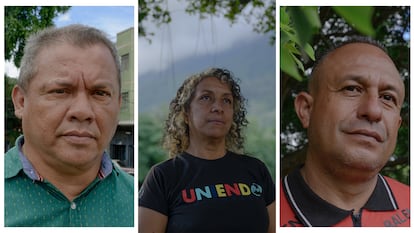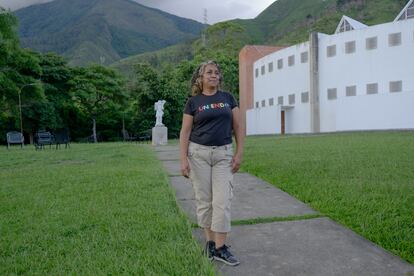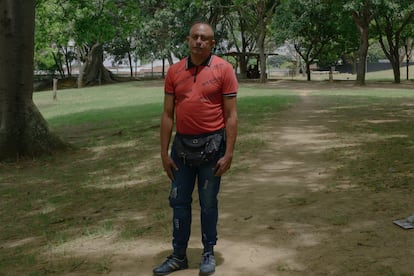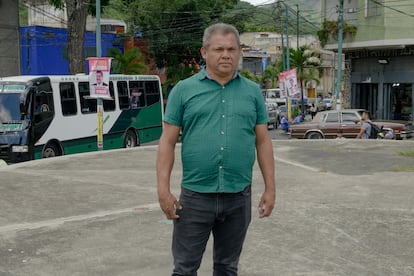Venezuelans who have turned their backs on Chavismo: ‘The revolution was lost time, years of misery’
Over the last decade, the ruling party has lost a large part of its support base. The corruption and enrichment of the political leaders, in contrast to the impoverishment of the people, have led to deep disenchantment


Tamara Almeida is surprised that there are only three posters of Nicolás Maduro in her neighborhood in Petare. Not long ago, she used to put them up herself, and there were many. This is how she measures what the polls say. In order for the opposition candidate, Edmundo González Urrutia, to have 59% of voting intent, a good number of Chavistas have had to switch sides. Tamara, 54, controlled several community councils in the huge neighborhood located east of Petare (in the Caracas metropolitan area), was a spokeswoman, ran a government feeding house, was part of the Chavista machinery that mobilized votes, and coordinated voting centers in the long Venezuelan electoral nights. Today, she has neighbors who do not even want to look at her when they cross her path, those who will not be able to count on her in the crusade to seek votes once again for Nicolás Maduro.
Until 2018, Tamara Almeida voted for Maduro. The control over daily life with which Chavismo manages the collapse generated by its economic model led her to disenchantment. “We don’t deserve a bag [from the CLAP basic food distribution program], we want to buy the food we want. They trample and humiliate and make people fight over little; there is division even over the use of a playing field in the neighborhood that should be for everyone and not for one communal council or another,” says the community leader, who defends the idea of socialism but not the brand that the Bolivarian revolution tried to implement. “Socialism is for those of us who are interested in the wellbeing of others, and Madurismo is not. Now the poor are poorer.”

Since Maduro assumed power in 2013 with a 1% advantage over his opposition opponent, the political base of Chavismo has been frayed until it no longer represents a majority. Polls today place guaranteed votes for Maduro at 15%, a number that could reach 25% if moderate Chavismo is included. However, a poll published this week shows that even among these groups there is a desire for a change of government. Although the collapse of the economy has slowed in recent years, Venezuela has lost two thirds of its GDP along the way, as if it were a country at war. More than seven million Venezuelans have left, the largest exodus in Latin American history. Maduro’s government has barely left room for the opposition, which it has persecuted and imprisoned. The country has been breathing poisoned air for years.
Even so, Maduro’s campaign team claims that he can win, clinging to the so-called 1x10x7 strategy (which consists of each voter convincing 10 people, and these, in turn, another seven). “The 1x10 is not realistic,” says Tamara, who convinced many herself in the past. “Of those 10, only two or three will actually go and vote for Chavismo.” Even today, some of her family members who work in the public administration are asking her to vote for Maduro. She will vote for Urrutia, adding that she does not identify herself as an opponent but as a “generator of change.” “In 1998 I voted for Chávez for a change, now I will vote for a change for the better.”
Douglas Hernández, 54, and Cleimer Márquez, 49, were comrades in Chavismo. They were members of Hugo Chávez’s first party, Movimiento V República, and rose in the community structures in Antímano, considered a United Socialist Party of Venezuela (PSUV, the ruling party) stronghold in Caracas, a bastion of the government for years. In his political work, Douglas coincided with high-ranking members of the current Chavismo hierarchy, such as Maduro’s wide, Cilia Flores, and Freddy Bernal, as he rose to become president of the parish council of his sector, one of the instances of decentralization of local power eliminated by the government. Before Maduro came to power, Hernández began his separation from the movement. He considers that stage as a lost year in his life and that of the country: “When I turned my back on Chavismo, I asked God for forgiveness for having supported them because the revolution was lost time, years of misery.”

Hernández’s detachment awakened Márquez’s concern, and he accused him of betraying the revolutionary process. He voted for Maduro, whom Chávez designated as his political heir before his death in 2013. Márquez was spokesman of a pro-PSUV political group and today says that the only legacy left by Chavismo is that the elite have become millionaires. He lived through the years of shortages and hardship while some PSUV leaders, with whom he walked the streets carrying out social work, began to line their pockets and drive luxury vehicles. “The PSUV is a party of wise guys, and that made me realize it.” Like many Venezuelans, Márquez was forced to emigrate during the worst years of the supply crisis, when there was a lack of food and medicines. He went to Peru and returned two years ago. “I was one of those who believed in Chávez’s project; I supported him for many years, I campaigned... I realize now that it has been a failure, that I was wrong, that we have to find a way out of this quagmire.”
Both men are sounding people out to vote for Edmundo González Urrutia. They are even doing so among the support bases of Chavismo, where they know that discontent is bubbling. Hernández says that if Maduro is proclaimed the winner, he will have to leave the country. On July 28, election day, Márquez will be driving voters around in his car. He works as a cab driver, a trade of survival, like almost everyone else in Venezuela. Regarding the elections, he hopes that people will have money to pay him for a ride and be able to stand on any street corner they wish. “I am also fighting for this for my three children: a 27-year-old, an 18-year-old and another who just graduated from elementary school at the age of 12. So that they don’t have to leave and that the Venezuela that is coming soon will give them opportunities,” he says, unable to keep his voice from breaking.

With no family leftist leanings, in 1998 Hernández and Márquez followed the political phenomenon embodied by Hugo Chávez, who awakened a euphoria for change like that inspired today by opposition leader María Corina Machado, who is campaigning for votes for Urrutia after being barred from running for the presidency by Chavismo. A quarter of a century ago, when they supported the comandante, then a military outsider, both men were in their twenties. Pedro Macho, a public transportation driver in a neighborhood in the west of Caracas, gave his vote to Chávez on his first and second electoral victories. By the time his third campaign came around, in 2012, the corruption that was already evident in the worsening of people’s daily lives made him change sides. His bus was also stolen, and he was unable to buy another one.
There is a sector of Chavismo, the most faithful ones, that was shocked on the day of their leader’s death in March 2013. They separate Chávez’s ideology from what it has ended up being under Maduro. Some of Chávez’s former ministers are among this group, a dissident formation that attacks the version of Chavismo currently in power, as do political parties of leftist affiliation, such as Tupamaro or the Communist Party of Venezuela, which previously hitched their wagons to the ruling party. Opposition organizations have been persecuted, judicially blockaded and stripped of their symbols and electoral cards for criticizing the future of the Bolivarian revolution. “You listened to Chávez for 10 minutes and applauded him, but I recognize that he is primarily responsible for everything we have been through,” says Márquez.
Among those disenchanted with Chavismo, there is confidence that July 28 will bring change. Having been part of the movement gives them a greater dimension of how diminished Maduro’s support bases are. In view of the power of intimidation deployed by the ruling party in recent months, which is increasing as the date of the polls approaches, they say that they are not afraid. “They are going to put us all in jail,” says Tamara Almeida.
Sign up for our weekly newsletter to get more English-language news coverage from EL PAÍS USA Edition
Tu suscripción se está usando en otro dispositivo
¿Quieres añadir otro usuario a tu suscripción?
Si continúas leyendo en este dispositivo, no se podrá leer en el otro.
FlechaTu suscripción se está usando en otro dispositivo y solo puedes acceder a EL PAÍS desde un dispositivo a la vez.
Si quieres compartir tu cuenta, cambia tu suscripción a la modalidad Premium, así podrás añadir otro usuario. Cada uno accederá con su propia cuenta de email, lo que os permitirá personalizar vuestra experiencia en EL PAÍS.
¿Tienes una suscripción de empresa? Accede aquí para contratar más cuentas.
En el caso de no saber quién está usando tu cuenta, te recomendamos cambiar tu contraseña aquí.
Si decides continuar compartiendo tu cuenta, este mensaje se mostrará en tu dispositivo y en el de la otra persona que está usando tu cuenta de forma indefinida, afectando a tu experiencia de lectura. Puedes consultar aquí los términos y condiciones de la suscripción digital.








































